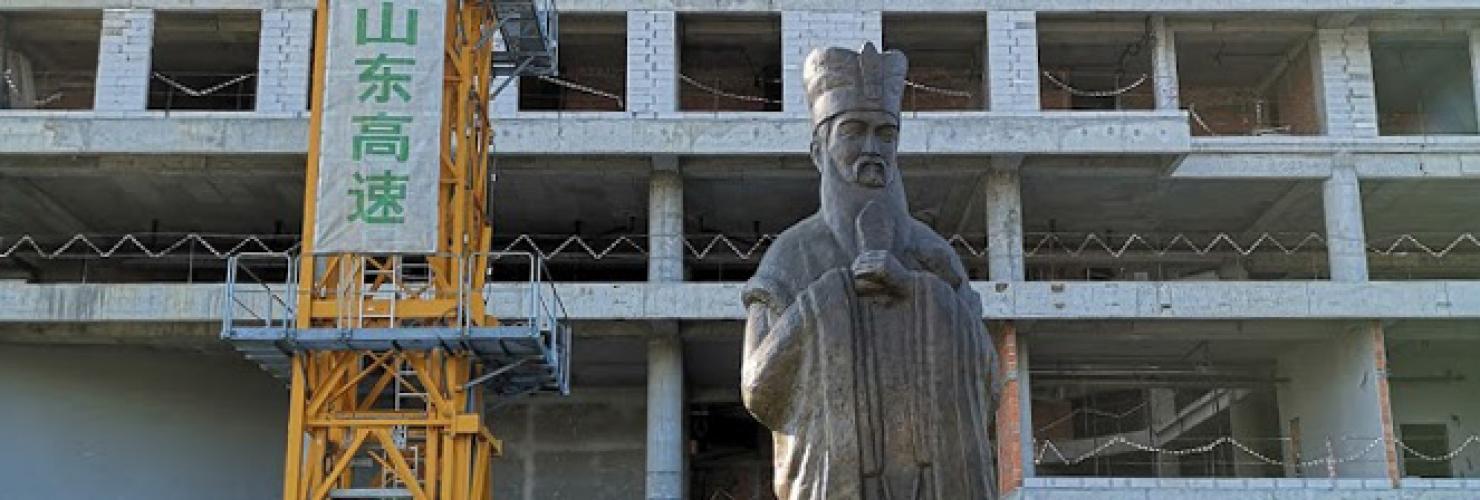

Belgrade briefings on bossy Brussels and benevolent Beijing
On his journey along the New Silk Road, Jacob Mardell discovers that Serbians are very happy to overstate China’s influence in the Western Balkans – and says EU leaders should take note.
From the beggar I meet on the banks of the Sava to the Serbian Foreign Minister I encounter at a conference - seemingly everyone in Serbia holds one political belief in common: that China is a friend of the Serbian nation, and that the Belt and Road Initiative (BRI) represents a golden economic opportunity. They might use different language - the beggar says, “China is here to help,” while Ivica Dačić calls Serbia “China’s greatest friend in Europe.” But they both express the kind of opinions about China that would seem very out of place in Berlin or Brussels.
China is a central pillar of Serbian foreign policy
The specter of China’s influence in the Balkans has captured the fearful imaginations of politicians in Brussels – EU Commissioner Johannes Hahn famously warned that Beijing is busy creating “Trojan horses” in the Balkans. My recent visit to Serbia and neighboring countries suggests China does indeed wield influence there, even if its economic impact remains minimal. More importantly, China’s sway has more to do with the region’s aspirations and its rocky relationship with the EU than it does with any Chinese ploy to undermine European unity.
China has been designated a central pillar of Serbian foreign policy since 2009. The Serbs describe the relationship as a “tireless steel friendship,” and government and opposition politicians alike view China favorably. But such sentiments exceed the economic reality of China’s presence in Serbia. In foreign direct investment (FDI) and trade, the EU continues to dramatically outpace China. Serbia is home to more Chinese investment than anywhere else in the region, but even here the EU’s 80% stock of total FDI eclipses China’s investments. Serbia in 2017 exported more than three times as much to the Netherlands as it did to China.
Serbians tend to overestimate China’s economic presence
An overblown impression of China’s presence in the Balkans is not solely a characteristic of EU politicians. Serbians also tend to overestimate the economic presence of China in their country. In a 2018 Serbian government survey, respondents named Russia and China as two of the country’s top three investors, far ahead of truly significant players like Germany. This is partly due to three high-profile investments Chinese companies have made or announced. The first of these was Hesteel’s purchase of Smederevo steel mill in a takeover that saved over 5,000 jobs.
Serbian politicians, keen to prove that their visions for Serbia’s future are bearing fruit, also like to bill Chinese loans for infrastructure projects as “investments.” Chinese projects such as Pupin bridge, which connects New Belgrade to the metropolitan outskirts of Borca, are widely publicized and highly visible, leading to the impression China is doing more than it actually is. But this willingness to see a beneficent China is driven by a definite feeling of political affinity.
China’s support of Serbia’s “territorial integrity” is prized
Its cornerstone is arguably Beijing’s strong reaction to Kosovo’s declaration of independence from Serbia in 2008, still an immensely emotional issue for many Serbians. Beijing’s support of Serbia’s “territorial integrity” is prized - and contrasts with the EU’s demands for Serbia to normalize relations with Kosovo, which Serbians deeply resent. Beijing’s attraction for Serbia can only be understood in the context of Serbian distaste for “the West” and dissatisfaction with the Berlin Process, which is meant to bolster the relationship between the EU and the Western Balkans.
Everyone I speak to in Serbia, even those in favor of joining the EU, voice a negative opinion of Brussels. They speak of incessant demands, and of being endlessly strung along the path of European integration. They complain about Western paternalism, European arrogance, and talk about Brussels’ inability and unwillingness to understand the region. The EU’s backing of Aleksandar Vučić – the country’s increasingly authoritarian president – is a particular concern. EU support of his “stabilocracy” is seen as yet further proof of Brussels’ double standards.
All this makes Chinese pragmatism very attractive. According to most people I speak to in the Western Balkans, China just wants to do business and drive development – it has no interest in the social and economic restructuring that Brussels sees as its mission. Dragana Mitrovic is Serbia’s foremost China expert, and, she says, the only public critic of Chinese investments. But even she describes Brussels as “a bureaucratic machine with no respect for local requirements” and Beijing as a partner that offers “a different economic model with no preconditions.”
Dissatisfaction with Brussels has boosted the appeal of Beijing’s offerings
The point is not so much that Beijing is vying with Brussels for influence in the Balkans, as that dissatisfaction with Brussels has boosted the appeal of politically neutral - and largely paltry - offerings from Beijing. Amel Kovacevic, Sarajevo’s Finance Minister, describes the Balkans as a “vacuum” China is now starting to fill. Most interlocutors stress there can be no “alternative” to the EU. But the bloc is not as revered as it once was - and Beijing is flavor of the moment.
In Belgrade, I attend a Belt and Road conference. It is hosted by Belgrade University and attended by top Serbian politicians and military. The foreign minister speaks of the Belt and Road as “one of the most important initiatives in the history of mankind” and another politician calls Serbia a “home away from home for China in Europe”. Other speakers also use phrases lifted straight from Beijing’s playbook. But it would be a mistake to assume that anyone in this Tito-era auditorium in the suburbs needs encouragement to praise the Belt and Road Initiative. Yes, the Chinese embassy is funding the event, but Serbian belief in Beijing appears genuine.
